How long can I survive without food and water? These are two of the first questions you will need to address in a survival situation.
We all know we can’t live without food, water, sleep, oxygen, and shelter for very long. We can live for a month or two without some of these needs, but for others (like oxygen), we can’t live for more than several minutes.
Trying to survive without water, sleep, or food should not be taken lightly. You can irreversibly damage your vital organs if you’re not careful.
You should have a general idea of how long you can live without food and water. Then, if you’re prepared with the proper knowledge, you can survive some difficult situations.
In general the human body can survive for the periods of time listed below before it needs food, water and sleep.
- Food – 1-2 months
- Water – 3-7 days
- Sleep – 11 days maximum
Table of contents
How Long Can You Live Without Food?
If you’re deprived of food, you can likely survive long enough to find a source of nutrition. Your body can sustain itself for up to 2-3 months on your fat stores.
There are recorded hunger strikes where participants lived up to 70 days without food. Unfortunately, many of them did die before the strikes were over.
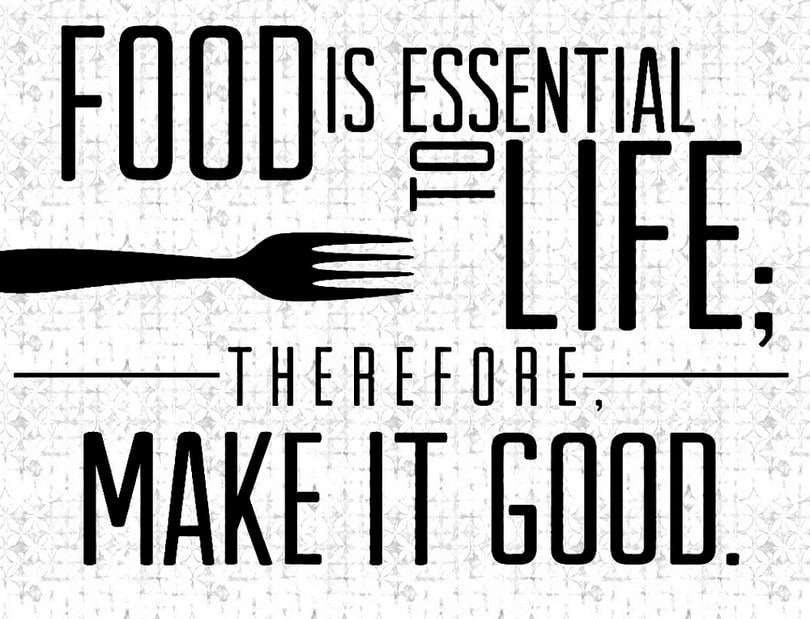
Several factors determine how long a particular individual can survive without food – genetic predisposition, activity level, size, etc. For example, the more hydrated you are, the longer you can survive without food.
A well-known example of this is Gandhi, who, while on a hunger strike for his country’s independence, survived 21 days simply drinking water.
If you starve for days and weeks without water, it is difficult for the body to break down and remove toxins. When people subsist on near-starvation diets without adequate water, they can induce irreversible organ damage.
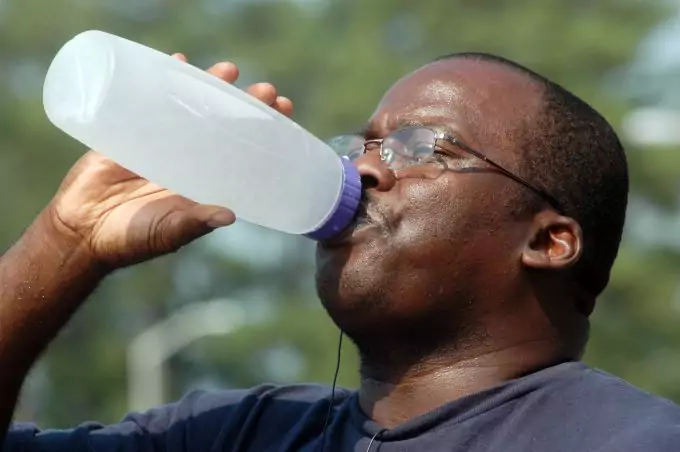
Dehydration will definitely shorten survival time during starvation.
Stages of Starvation
There are several stages of starvation.
- Fat Stores – The body will use its fat stores to provide energy while you search for food.
- Ketosis – After 1-2 days, the body will begin burning fat reserves in the liver and other organs. Fatty acids produced by the liver are called ketones.
- Tissue Destruction – Once your body is depleted of fats reserves, it will begin to consume itself, using tissues from the intestinal walls, muscles, and organs.
- Damage – The longer starvation lasts, the lower the chance of repairing damage to your body. If starvation continues for 3-4 weeks, damage may be irreversible. Potential damage to the heart is deadly as it becomes weaker and weaker before finally shutting down.
On average, the starvation process lasts about a month. Survival time depends on a person’s fat stores, body strength, immunity, and hydration status.
How Long Can You Live Without Water?
It is more difficult to survive without water than it is to survive without food. Water is essential for removing waste from the body.
The liver and kidneys will fail in a few days without water. In extreme cases, people may live up to 7 days without water by conserving energy and avoiding water loss through sweat and evaporation.
It is hard to survive for a long time in the wilderness. You might make it 3-4 days, but you will have to search for water, therefore lose energy and water quickly (via sweat).
Winter may be exceptionally dangerous since the body requires water to regulate its temperature. If a person is dehydrated, they lose body heat much more quickly.
Life is balance, and dehydration is no exception. Around an average of 80 degrees, an average body can survive for up to 7 days, but as temperature increases, the lifespan shortens quickly.
See also: Survival Needs: You Should Know Your Body
Why the Body Needs Water
To understand why water is important, we need to understand its functions in the body. We have discussed water’s role in detoxification and waste removal, but there are many body functions that rely on water.
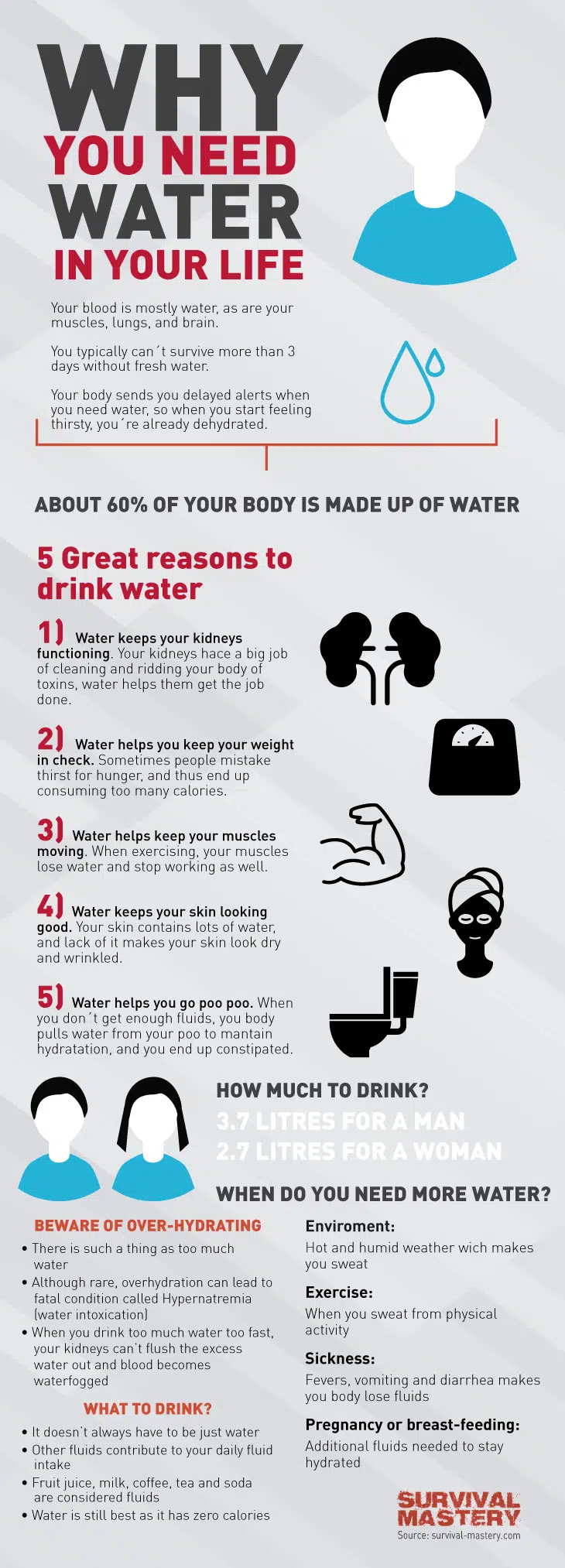
The body loses water through respiration (breathing) and thermoregulation. When it’s boiling, and you’re overexerting yourself, the body will lose fluids via sweat and respiration.
If that fluid is not replaced, your body will keep heating up. Proper hydration keeps the body cool and maintains normal body temperature. If the body does not have fluids to sweat, it will overheat, resulting in organ damage.
In severely hot conditions with overexertion, the average person can’t survive for more than several hours without water.
Water also keeps your joints healthy. If the water content in the joints decreases, they will become painful and even swollen.
Additionally, without water, your body cannot digest food. Hydrochloric acid (AKA stomach acid) and saliva are both required to digest food properly. Both of these consist mainly of water, and without them, there is no digestion.
Stages of Dehydration
There are different stages of dehydration in the body, and obvious signals that you entering a dehydration stage.
- In the first stage of dehydration, you will experience symptoms including a dry mouth (lack of saliva) and infrequent urination. The urine’s color will be dark yellow to dark orange and will have an unpleasant odor.
- In moderate dehydration, you’ll urinate infrequently, and the amount will be decreased significantly. Your eyes will feel dry and slightly swollen. In addition, you will feel tired, and your heartbeat will be unnaturally rapid.
- With severe dehydration, you will no longer urinate. Lethargy will set in, and you’ll be exhausted and irritable. The dehydration is likely to be worsened by vomiting and diarrhea. In the end, you’ll essentially suffer from shock. Your skin will turn bluish-gray and be very cold. Your blood pressure will decrease significantly, which is why the body will become cold and the skin extremely pale.
Additional Symptoms
Symptoms effect each individual differently, but you may also experience the following effects.
- Your hands and feet may feel colder. If you’re dehydrated 2-3%, this means your blood has thickened almost 20%. As a result, your blood’s volume has diminished, causing it to become thicker and circulate more slowly. It takes more energy to oxygenate the extremities, such as the fingers and toes.
- Thin capillaries in the brain cannot transport thick blood. As a result, the brain will enter an oxygen-deficient state, causing hallucinations. In extreme cases, you may lose consciousness.
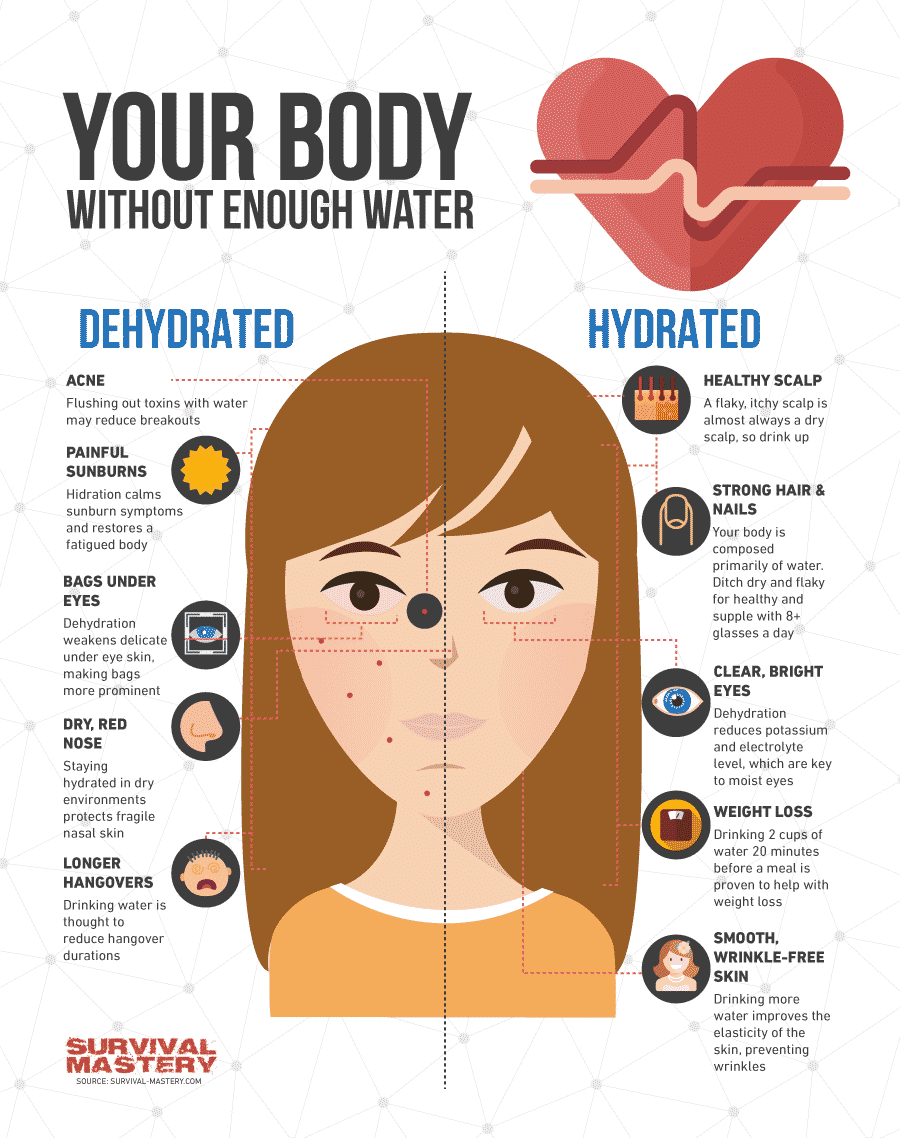
Overall, to survive 6-7 days without water, you’d have to be a healthy person existing without exertion in a calm environment.
In the wilderness you would average about 3 days due to your need to located food and water, and the exertion needed for these activities.
How Long Can You Live Without Sleep?
Determining how long you can live without sleep is tricky. The record for the most extended period without sleep (not using stimulants to stay awake) is 11 days or 264 hours.
It is still not completely clear why the body needs sleep (although there are many good articles) and why less than 6 hours a day can cause a deterioration in your health. However, it’s been estimated that people who sleep 6 hours or less per day have a reduced lifespan.
There are definite impacts on the body’s functions when it does not receive the proper sleep.
- In the first 24 hours, the average person will usually suffer from headaches.
- After 72 hours, an individual will become disoriented and start experiencing cognitive issues and memory loss.
- As sleep deprivation continues, hallucinations along with a lack of control will occur.
Even after the first 24 hours, the immune system will weaken by up to 50%. This makes a person vulnerable to illnesses, infections, etc.
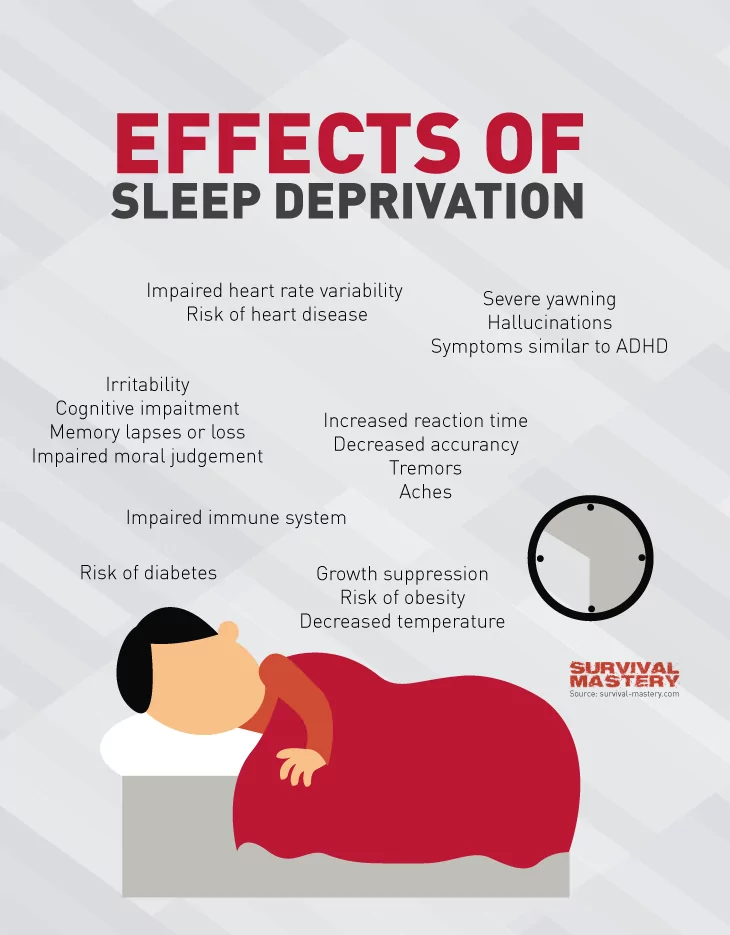
Why Does the Body Need Sleep?
During sleep, DNA is repaired, and damaged cells are replaced by new ones. Therefore, the body needs sleep to repair any damage it has experienced throughout the day.
When the body is sleep-deprived, it enters a state of high stress. As a result, mental capacity is limited, concentration is reduced, stress hormones increase, and blood pressure rises. This can cause heart attacks, especially with older people or people with health problems.
Read this article to better understand the benefits of sleep for the body.
Tests on rats have shown the body reaches a high metabolic state when sleep deprived. As a result, the body will burn nutrients and fat stores more quickly than they can be replenished. It is also more prone to infections and illnesses as the immune system weakens.
Sleep deprivation doesn’t lead to irreversible conditions since it doesn’t damage organs like dehydration and starvation, but this doesn’t mean you should experiment with sleep deprivation.
The full impact of lack of sleep is still unknown, and in essence, you are experimenting with your mind, which is the last organ you want to test.






There is a mistake in the text in bold: ‘Sleep – from 1 month to 1-2 years’. I hardly believe that someone can have a sleepless life for a month or even a whole year! =) My own record is 3 days without a nap, It was 10 years ago and I was a student. I needed to deal with a huge amount of studying material and experienced a great lack of time. As far as I remember, all my reactions were sooo slow by the end of the 3rd day!
In record, the longest time someone has stayed without sleep is 264 hours (11 days).
The more I browse through this website the more I start thinking that Samuel Funt has really had an interesting life! :) I mean, if one has expertise to write all those articles, they must have had it.
But I always try to take all those you-need-to-know-it-to-survive issues and apply them to our everyday life. And I’d like to mention that many people nowadays confuse _water_ consumption with _liquids_ consumption. And curious as it may sound, our body recognizes everything that is not pure water as food! Tea, coffee, milk – everything! Not to mention alcohol that is not food but is likely to dehydrate you even more.
InnaM, I have to disagree, liquid is liquid as far as the body is concerned with the exception of alcohol. Drinking tea and coffee does not dehydrate you, it just rehydrates at a lesser rate than water which is where a lot of people get confused.
Think about this on a simple level, if you only ever drunk coffee or tea for a week you would eventually die or become dangerously dehydrated. I have several friends and family who never drink water and have lived on juice, soda or coffee for years and are still very much alive.
Your body does not need you to drink water, again think about this from a simple purely evolutionary stand point. Eskimoes and those who lived on the african plains for centuries managed without regular and ready access to water. They manage to get liquid from food and hydrate that way instead.
The body is an amazing machine that does some pretty cool things in order to stay alive including accessing water from various sources.
That’s true Inna, but you should know that water is not always the best hydration method. One can try sports drinks or coconut water.
That’s true, water can be obtained from various sources. However, without water (regardless of source), we won’t be able to live. In an emergency situation when you’re already starting to dehydrate, it’s best if you can find plain water. Adding other ingredients to it like tea or coffee won’t do you too much good.
Regarding the fact that there are people who don’t like simple water and avoid it as much as possible, I won’t say it’s not true. It’s possible.
Loved the info. I pinned all the info graphs to my emergency board and linked to this page in my new blog post. Every human needs to read this!
It is always good to have reliable info with you at all time when out there. Linking the article is a great idea.
The three most essential factors you need for good health and proper development of your body are water, food, and sleep. The absence of these factors leads to a malfunctioning of the body system and consequentially death. Failure to sleep for 264 hours can lead to death. Starving for one to two months could be lethal, and dehydrating the body for more than 72 hours is indeed fatal. What should one do to stay safe and survive in tough emergency situations, when it is impossible to have these 3 essentials complete?
This posting provides you with the most crucial info you need. However, you can survive up to 3 weeks without food. As far as water is concerned, that’s a different story, but there are people who have survived 8 to 10 days without water.